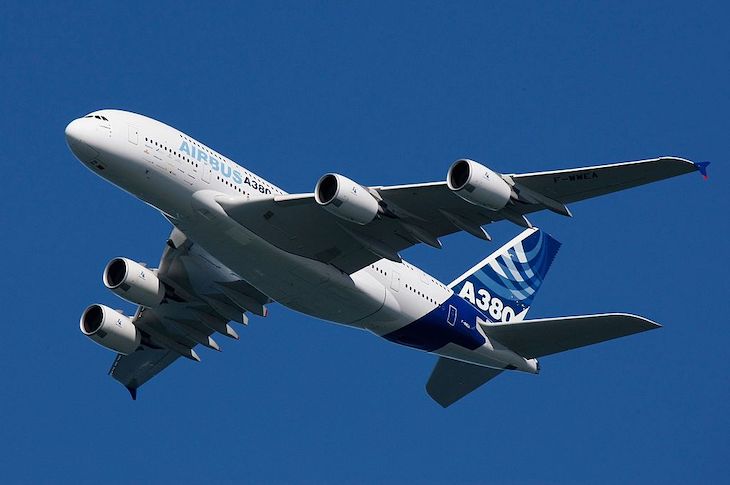A French member of the board of Airbus – the giant European aircraft and aerospace group – once told me that the French thought of it as their company while the Germans thought it theirs. In reality, both countries own it: the French state owns 11 per cent of Airbus capital, Germany 10.9 per cent and Spain 4.17 per cent, with the remaining shares quoted on Euronext. Assembly of Airbus planes from across Europe takes place in Toulouse, where the company’s operational headquarters are located, but the company’s official registered headquarters are in Leiden, Netherlands. For Brussels, Airbus is a model of European integration and EU strategic autonomy. But the invisible ingredient is the UK. In practice, Britain is one of the biggest partners of Airbus commercial aircraft, Airbus defence, space and missile production. Indeed Britain’s relationship with Airbus mirrors its relationship with the EU.
The Airbus consortium was founded in 1970 by Germany’s Messerschmidt-Bölkow-Blohm, VFW-Fokker and France’s Aérospatiale, later to be joined by Spain’s CASA. British Aerospace became a member in 1979. A widening and deepening process continued with moves into military aircraft, helicopter, missile and satellite construction. British defence industry participation spread to missiles and satellites. British Aerospace had a 20 per cent stake in the highly complex Airbus consortium, equal to that of Germany’s DASA and France’s Aérospatiale, with a smaller holding for Spain’s CASA. British Aerospace also had a 25 per cent stake in Airbus space and defence division. Further integration of this European aerospace ‘common market’ was planned. The problem was the state-owned French partner Aérospatiale. The British and Germans believed their French partner was subject to manipulation for national rather than commercial reasons.
The initial acrimony of departure from EU institutions gives way to opportunities for close cooperation
As in the European Economic Community (EEC), the triangular dynamic between British, German and French interests could be highly frictional. British and French or German and French cooperation in Airbus could be harmonious at the industrial level, but on the organisation of the consortium relations were frayed. Eventually the French state agreed to relinquish its share in its commercial champion, opening the way for Airbus to be established as a fully commercial stock company in 2001. In the meantime, a renamed and augmented BAE Systems found the bureaucratic and un-commercial structures and processes of the European consortium too cumbersome and sought to leave, with an eye to expanding its commercial interests globally, notably the USA.
As early as 2000, British Aerospace let it be known that it wished to sell its 20 per cent stake in Airbus. Unhappy at this prospect, the consortium put substantial obstacles in the way to block the negotiated departure. Six years later the British company was only able to extricate itself by exercising a put option through its bankers Rothschilds, enabling it to sell its share-holding in Airbus. Six days later, Airbus announced problems with the major A380 plane project driving down the share price and with it the value of British Aerospace’s £2 billion holding. By this time, British Aerospace’s board was determined to leave. Like the 2016 referendum, British Aerospace put the sale of the company’s stake to shareholders who, on 13 October 2006, voted in favour. This ended the British company’s formal membership of the consortium.
But British participation in Airbus by no means ended there. BAE Systems’ expertise and technological strength as the largest defence contractor in Europe and the seventh largest in the world was vital to the European consortium. The British company negotiated a deal to continue supplying Airbus with virtually all it had done in the past. British industrial and scientific participation in Airbus has grown, but without the administrative and restrictive burden of the complex share-holding structure.
Today, the wings of Airbus commercial aircraft are made in Britain, not to mention landing gear and, according to airline options, main engines. Indeed, on the Airbus A380 jumbo-jet engines are predominately Rolls Royce, and are exclusively so on the new commercially successful long-haul wide-bodied A350. In the grand scale of things, like Britain’s post-Brexit trade agreement with the EU, little has changed from what it was, minus the bureaucracy and restrictions on who Britain can trade with. British manufacturers continue to make up at least 20 per cent of Airbus commercial aircraft. BAE Systems has continued with a 37.5 per cent stake, equal to that of Airbus, in MBDA, one of the largest missile manufacturers in the world. Meanwhile BAE Systems has had the freedom to develop its global interests, notably in the US, where it is a major partner on the F-35 combat aircraft programme. In general, the initial acrimony of departure from EU institutions and projects does give way to opportunities for close cooperation based on mutual advantage rather than bureaucratic conformity.







Comments